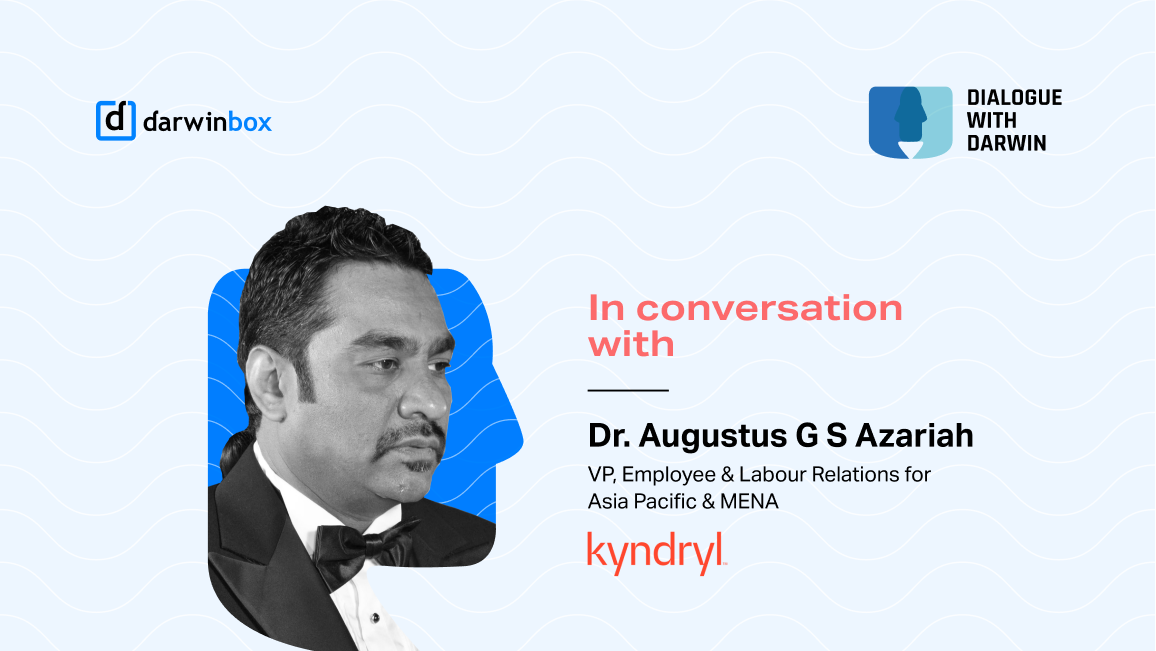

In this episode of Dialogue with Darwin, we are joined by an individual who is at the forefront of HR transformation, Augustus Azariah, Employee & Labor Relations Leader at Kyndryl, Asia Pacific Middle East & Africa region.
His journey started in tech sales consulting and training around the same time when the IT industry was gaining roots in India, and from then on, he has had two and a half decades of experience in HR functions. He holds numerous accolades as well as an honorary doctorate for his contribution to the HR function and has held various leadership roles within IBM India, HR.
Mentor to several startup founders and a staunch supporter of women's employability and stem education for the girl child, he talks to us about the ‘Future of Work,’ that much-debated topic – hybrid work, talent management, and much more.
Listen to the full podcast here:
Here are a few excerpts from the interview:
Darwinbox: How do you view the future of work with the workforce in a return-to-work mode?
Augustus Azariah: We are in what I would call the ‘Now of Work’. We have been speaking about the future of work for a very long time, but it is the now of work. With the now of work comes new ways of working. So, the new ways of working are also accelerated by the workforce shift during the pandemic.
Now, how does it look? We need to look at the sentiment of employees on the return to the office. 50% are in base locations and would like to come to work. And some of them are already coming into office campuses and working, or they're at client locations where clients do insist that they must be there, with all safety protocols in place. There is the other, younger workforce, who migrated from other cities into their base locations and went back home during the pandemic due to various reasons.
And some of those folks are also engaged with eldercare or childcare and various such things. And the pandemic has taken its toll on various families. So, they need time. So, half of your workforce is ready to work, albeit in a hybrid manner. For the other workforce, we must give them time, we have to be sensitive to their needs. And some of them will have to come back and get new home deals because people moved lock, stock, and barrel during the pandemic. Some could have health issues. In terms of childcare, creches are not yet open, very selectively they have opened. So, you must consider all these aspects before getting into the workforce and look at certain exceptions.
For example, pregnant women or those who are on maternity, and then there could be others with comorbidities, who are unable to come to work, then you allow them to figure out, hey, what do I do? Do I need to look at other opportunities for this person? Okay. So, lots to think about here.
Darwinbox: If you could briefly touch upon what it means for organizations to be prepared to welcome a hybrid workforce to the office?
Augustus Azariah: I think welcome has been the often-repeated word here. Right? A lot of companies have done various activities to welcome employees, but to be very honest with you, did it get the desired result? The answer is no.
A clear policy is required to be defined. Once you have defined it, you need to run enablement for managers and supervisors so that they engage with their people more effectively in terms of what this hybrid work policy would have.
Would you be working 30%, 50%, whether you would be going to the office? Will you even have your own workstation? Are you going to have a revolving or repeating workstation? And therefore, what about my safety? Because somebody else was using my workstation some time ago. You know, there are various such questions in people's minds.
That limits their ability to take that step to come to the office. But I do not think there is a huge resistance as such. People really want to come to the office. They want to meet friends. They want to be with colleagues. They want to collaborate; they want to have those water-cooler moments and communications.
So, the organization needs to communicate their return to office policy in a clear and lucid manner, while highlighting the security concerns, safety, and any other considerations that people might have. It is more to make sure that people feel safe about coming back and people feel completely informed about what it means to come back.
Please watch the full video interview here:
Darwinbox: Another space that you have spoken about and is also going through a transformation; how do you think organizations have been renting talent management and talent development in the current times?
Augustus Azariah: We are in a gig economy; we have a gig workforce. It is about talent management and talent development teams looking at this workforce very clearly. And they are here to stay. So first, you have different types of workforces. You must ensure it is like a menu card or like a recipe. You must put so much of all these things into getting it right, what I would call the right workforce mix. Once you have the right workforce mix, you decide what temperature you want to put it in the oven and get what you want out of it. So, talent development and talent management folks need to be very adaptable and open to what the business needs. We must have very clear flexible, scalable talent development and management.
Darwinbox: How do you think that would be shaping up given the composition of the workforce becoming more gig, or hybrid, even multi-generational like you mentioned?
Augustus Azariah: In terms of the performance management space, it is a process of continuous improvement. So, while you are driving a high-performance culture, you should also focus on how you are going to be managing low performers or those who are trending to plateau. Because in some cases, you know, there is technology redundancy. And in some cases, carrier velocity has slowed down, so right now, you would do reskilling upskilling and things like that.
But wherever you do not get the desired results, I think organizations should have a very clear focus on managing performance.
Augie concluded the interview by giving us a glimpse into his favorite book, his tips to balance work and life in a hybrid setup, and his life's motto.
Do watch other episodes of Dialogue with Darwin here:


Speak Your Mind